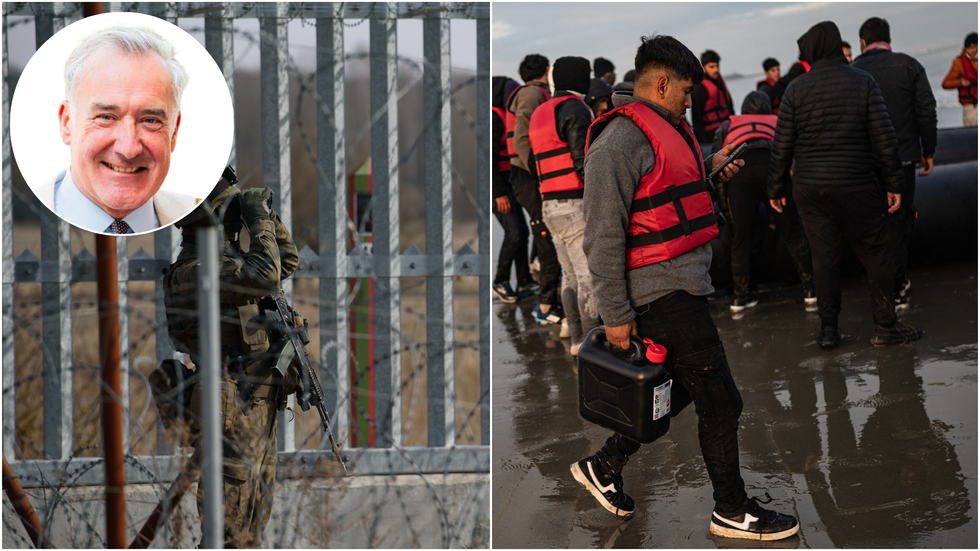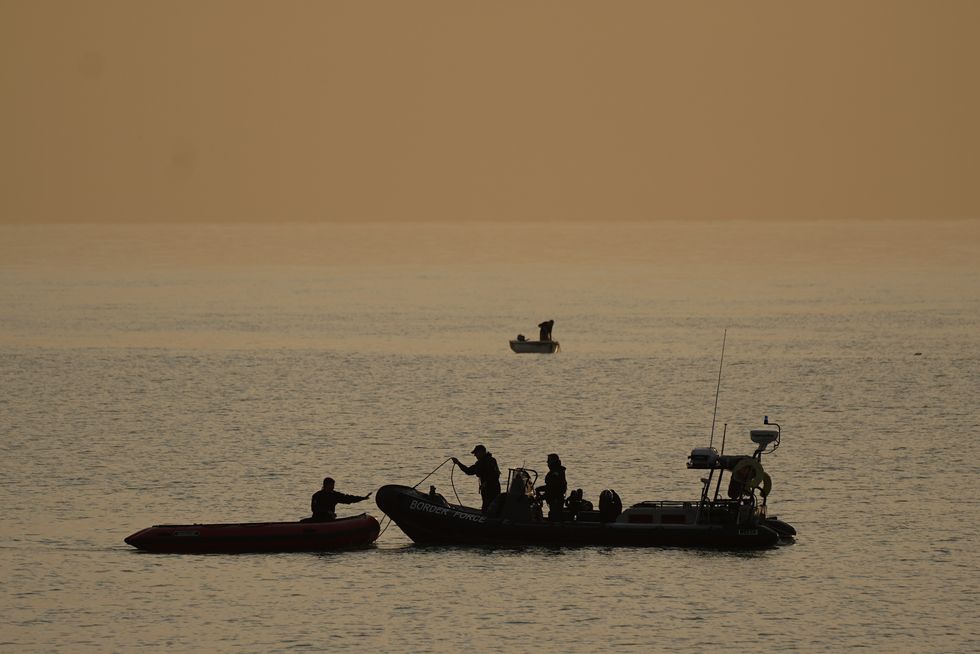Patrick Christys on how mass migration is making British people poorer, and …
GB News
OPINION: Britain must follow Poland in using force to protect our borders from illegal migrants, says Colin Brazier.
Don't Miss
Most Read
Trending on GB News
Picture the scene. A huge metal fence, 20-feet high at least. Some kind of national border. Suddenly, sparks fly. A hole appears, followed by half a dozen furtive-looking males carrying a make-shift ladder. Before they can move off, an army Humvee screeches into shot. Heavily-armed soldiers jump out with rifles raised and a demeanour which, to use the military euphemism, is one of ‘extreme prejudice’.
The footage is mute, but it’s clear the troops are not there to bandy pleasantries. What happens subsequently is unclear. The video, released this week, has been edited and jumps forward to a scene where all of the migrants - for that is what they are - are lying face down.
The Mexican border? No, this is Poland’s international boundary with Belarus. Those migrants were seeking to enter Europe, perhaps bound for the UK. They weren’t stopped by a Trump Wall or right-wing populist regime. Poland veered to the Left 15 months ago. But like many ‘progressive’ governments, Poland has also had enough of illegal migration. On Wednesday it suspended the right of migrants to apply for asylum there.
I mentioned that the video footage has a gap. We don’t get to see how the migrants are physically restrained by the Polish border guards. This sort of thing infuriates human rights charities and NGOs. This week, in a report called ‘Brutal Barriers’, Oxfam condemned Polish soldiers for, among other things, allowing their dogs to tackle migrants who are facing cold weather without access to medical care or food.

Britain must treat migrant boats with force - but don't expect the MSM to act fairly - Colin Brazier
GB News/Getty Images
It should come as no surprise that Oxfam takes a dim view of any government which has the effrontery to protect its own borders. The charity has travelled a long way since its creation in Oxford in 1942. Its high-street shops may still employ an army of well-meaning volunteers offering bric-a-brac, but Oxfam these days is just as keen on peddling woke ideology. This, after all, is a charity which no longer talks about having headquarters because, according to its own 92-page Inclusive Language Guide, the word ‘headquarters’ implies “a colonial power dynamic”.
The idea, however, that migrants are wholly victims and in no way the authors of their own misfortunes, is widespread. Our own government prefers to see those who seek to clandestinely enter Britain as almost without any personal agency, even less blame. Predated on by traffickers. Left to the mercy of the English Channel. Not by their reckless determination to cross a major shipping lane, but by the UK’s failure to provide enough water taxis to bring them ashore.
This week, for instance, a month-long inquiry finished hearing evidence into ‘Incident Charlie’, the drowning of at least 27 migrants in 2021; the largest single loss of life since small boats started crossing from France in 2018.
The inquiry was told that stereotypes about foreigners meant the rescue operation wasn’t as effective as it might have been and that the tragedy was preventable. In such an atmosphere of national self-recrimination, who was going to point out one obvious verity: that such tragedies are indeed preventable. They can be prevented by migrants choosing not to risk their lives (and sometimes those of their children) in the first place. Not least by choosing to claim asylum in the first safe country they enter.
The inquiry also heard witness impact statements. A Somalian who survived the fatal voyage said a rescue didn’t come because refugees were seen as animals. This isn’t only a slur on the work of coastguards who risk their lives on repeated rescue missions, it also ignores the millions of Britons whose thoughts about illegal migration are never officially sought. The faceless masses for whom the arrival of thousands of undocumented males in struggling communities is the greatest preventable tragedy of the age. Where, they might ask, is the government’s inquiry into that? When do they get their victim impact statements?

Not all those seeking refuge in the UK are acting in good faith.
Getty Images
This is deeply uncomfortable territory. No right-thinking person seeks to be callous and inhumane. Our human instinct is to assume all those who seek sanctuary in the UK are acting in good faith. Increasingly, we realise that isn’t true. Where data on crime by nationality is available, it paints a bleak picture where some migrant groups do infinitely worse than others, even though we treat all of them equally.
And for that reason I think there is a growing public acceptance that governments must be willing to be forceful if illegal migrants are to be deterred. The release of footage of migrant arrests by the Poles this week seems to make exactly that point. They know that an effective hard border, backed up by force, isn’t just about stopping migrants at the point of entry. It’s about deterring others before they think about leaving home in the first instance. If you come, expect to be greeted with a rifle, not a blanket.
For British officials this calculation is even more pointed. If we were prepared to show would-be migrants that attempting to cross the Channel will end in failure, and that responsibility for failure (when it comes) is not ours but the migrants themselves, then the effect would be transformative.
If Britain were to announce, for instance, that (from a given date) it would physically force back boats - potentially risking harm to those on board - their would be howls of outrage from charities. But the short term pain would yield long-term humanitarian gain. If fewer migrants attempted the perilous voyage, fewer would perish along the way.
Don’t expect the MSM to treat this issue fairly. In 2015 I travelled to Croatia, Serbia, Greece and Hungary with a TV crew to cover the arrival of hundreds of thousands of migrants ‘from Syria’. On the Hungarian border I watched young men in Jihadi bandanas hurl rocks at police blocking their way deeper into Europe.
When the tear gas settled my colleagues gathered around a stretcher, not carrying one of several riot-policeman felled by rocks, but bearing a pregnant woman wearing a headscarf. That, for them, was the story. The testimony of millions of Hungarians who, for historical reasons have a well-founded fear of invasions from the East, did not feature.







